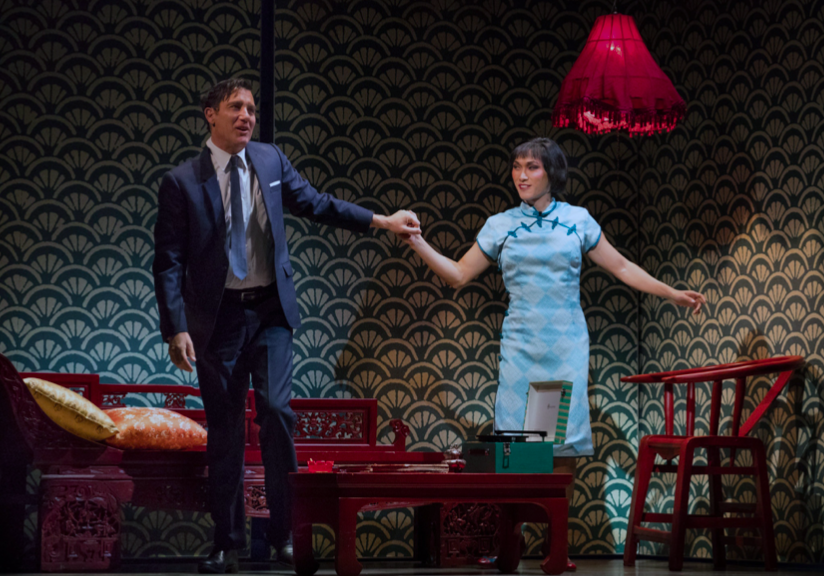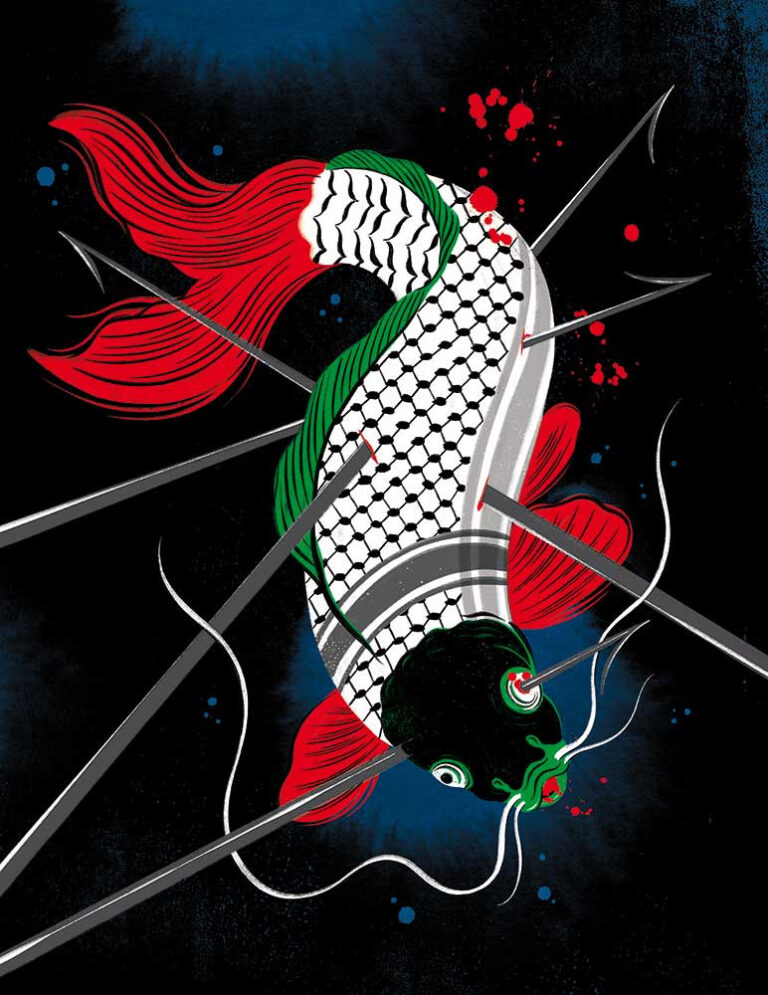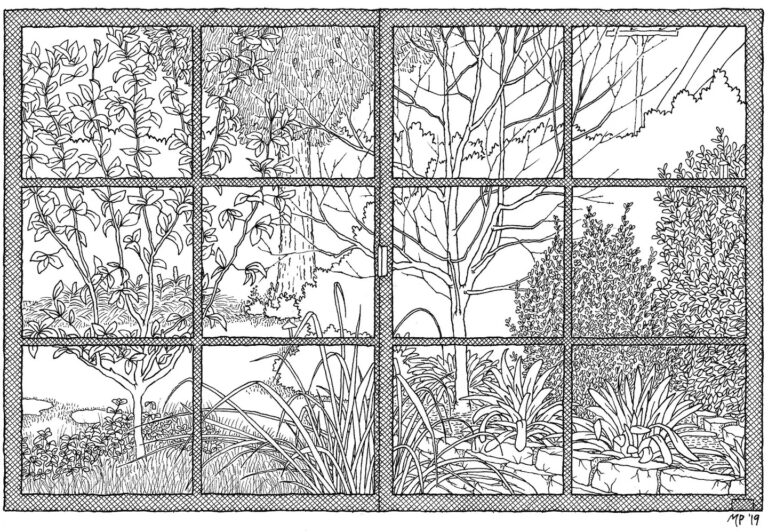Opinion | Close the Curtain on ‘Miss Saigon’ – The New York Times
Why is a musical that perpetuates a Western fantasy of Asians as small, weak and effeminate people still so popular?

Clive Owen, left, as Rene Gallimard and Jin Ha as Song Liling in a 2017 production of “M. Butterfly.” Sara Krulwich/The New York Times
LOS ANGELES — “Miss Saigon” is revived and on tour again, playing in a theater near me. This is exciting news for some fans of Broadway musicals, and for Asian and Asian-American actors with the chance for important roles. For others, to whom “Miss Saigon” perpetuates deeply held notions of Asian inferiority, this is bad news.
“Miss Saigon” is about a Vietnamese prostitute in Saigon during the war years who falls in love with a white male American G.I. He leaves for America without knowing that she is pregnant. She bears his son and when he returns, gives up the child to him so that he can save the boy and take him to the United States, far from Vietnam. Left behind, our prostitute kills herself.
I saw the musical in New York City in 1996, paying for tickets in the fourth row, an extravagant expenditure for a graduate student on a minimal fellowship. In my earnest idealism, I believed that I should see a work before I criticized it. But sometimes things are as they appear on their yellowface.
All around me, audience members sobbed at the tragic love story. I was disgusted. I could not help but think of how “Miss Saigon” was based on Puccini’s opera “Madama Butterfly,” set in Japan. In Puccini’s by-now universal story, two star-crossed lovers, a Japanese woman and a white man, together embody Rudyard Kipling’s dictum: “East is East and West is West and never the twain shall meet.” Because East and West are fundamentally opposed, the lovers are doomed, or, to put it more accurately, one lover is doomed — the Japanese woman. Happy to see that her child will live a better life in the West, she takes her own worthless life.
The playwright David Henry Hwang saw the absurdity of this story. His still-relevant play “M. Butterfly” precedes “Miss Saigon” but might as well be satirizing it, too. In this ultimate sendup of “Madama Butterfly’s” wish-fulfillment fantasy of white male desire, he reverses the roles of seducer and seduced. In Mr. Hwang’s play it is the white male, Gallimard, a French diplomat, who is conned by Song Liling, a beautiful Chinese opera singer who plays Madama Butterfly.
“What would you say if a blond homecoming queen fell in love with a short Japanese businessman?” Song says. “He treats her cruelly, then goes home for three years, during which time she prays to his picture and turns down marriage from a young Kennedy. Then, when she learns he has remarried, she kills herself. Now, I believe you would consider this girl to be a deranged idiot, correct? But because it’s an Oriental who kills herself for a Westerner — ah! — you find it beautiful.”
As it turns out, however, Song Liling is actually not a woman. Gallimard’s fantasy is the West’s fantasy of the Orient, where Asian women stand in for Asia as a whole — feminized, weak, in need of a strong hand to rescue her from oppressive Asian patriarchy. The gift of rescue is so appreciated by the weak Asian woman that she will do the most O. Henry of things, kill herself in gratitude for having had her life saved. Mr. Hwang draws a direct connection between these interpersonal, individual fantasies and the American conduct of the war in Vietnam. The United States’ biggest mistake in that war was to think, like Gallimard, that Asians were small, weak, effeminate people who could be cowed by the strong masculine power of the West.
Some people who are irritated by these criticisms of “Miss Saigon’s” enduring popularity will say, It’s only a show, nothing more. But the enjoyment of the show’s fantasy is precisely why the show matters. Fantasy cannot be dismissed as mere entertainment, especially when we keep repeating the fantasy. Fantasy — and our enjoyment of it — speaks to something we deeply want to believe. The enjoyment of this show is based on the privilege that the audience feels, the privilege of not being that Asian woman who kills herself, the privilege of seeing the world from the viewpoint of the powerful white male savior who can both be so attractive that a woman would kill herself over him and be so paternal that he can adopt the mixed-race child who will stand in for childlike Asia, in need of Western benevolent guidance.
Racism and sexism are not incompatible with art, as Chinua Achebe showed in his attack on Joseph Conrad’s “Heart of Darkness” as racist. Our enjoyment of a work of art does not mean that the work cannot be racist or sexist, or that our enjoyment does not come from a deep-seated well of derogatory images of Asians and Asian women. The unsettling paradox here is that we can indeed love and desire people whom we see in completely racist and sexist ways. That is the real, unintended universal truth of “Miss Saigon.”
Should “Miss Saigon” therefore be censored or canceled? The question is a distraction from the real answer, which is that censorship or cancellation does little to address the inequities of Broadway and Hollywood. Perhaps those of us who detest the musical would not be so upset if there were other stories about Asians or Vietnamese people that showed their diversity. If there were a thousand stories onstage and onscreen about us — or even if there were just a dozen — we might forgive “Miss Saigon.”
In 1993, not long after the Broadway debut of “Miss Saigon,” the writer Jessica Hagedorn titled her anthology of Asian-American literature “Charlie Chan Is Dead.” Charlie Chan, indeed, seems to be dead. Now it’s “Miss Saigon’s” turn to die.
The Times is committed to publishing a diversity of letters to the editor. We’d like to hear what you think about this or any of our articles. Here are some tips. And here’s our email: letters@nytimes.com.
Viet Thanh Nguyen, a contributing opinion writer, is the author, most recently, of “The Refugees” and the editor of “The Displaced: Refugee Writers on Refugee Lives.” He teaches English at the University of Southern California. @viet_t_nguyen
A version of this article appears in print on Aug. 3, 2019, Section SR, Page 6 of the New York edition with the headline: ‘Miss Saigon’ Must Die


